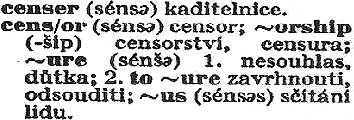
The following are some definitions, usage histories and translations of censorship. We invite you to add your own or submit other citations in the submit case section of The File Room.
b. spec. of the press; see CENSOR sb. 2b.1827 Hallam "Const. Hist." (1876) III. xv. 166 Even during the existence of a censorship, a host of unlicensed publications... bore witness in the inefficacy of its restrictions. 1841 W. Spaulding "Italy & It. Isl. III" 80 In the middle of 1806, a decree of the viceroy declared, that no literary censorship should be instituted. 1855 Macaulay "Hist. Eng. IV". 540 The law which subjected the press to a censorship. 1876 Green "Short Hist." viii. 5 (1882) 514 The censorship struck fierce blows at the Puritan press.
c. as a university or college office1880 T. Fowler "Locke" ii. 12 The Censorship of Natural Philosophy...he appears never to have held.
Censorship is a word of many meanings. In its broadest sense it refers to suppression of information, ideas, or artistic expression by anyone, whether government officials, church authorities, private pressure groups, or speakers, writers, and artists themselves. It may take place at any point in time, whether before an utterance occurs, prior to its widespread circulation, or by punishment of commincators after dissemination of their messages, so as to deter others from like expression. In its narrower, more legalistic sense, censorship means only the prevention by official government action of the circulation of messages already produced. Thus writers who "censor" themselves before putting words on paper, for fear of failing to sell their work, are not engaging in censorship in this narrower sense, or are those who boycott sponsors of disliked television shows. Yet all of these restraints have the effect of limiting the diversity that would otherwise be available in the marketplace of ideas and so may be considered censorship in its broadest sense.
There are almost as many justifications offered for the suppression of communication as there are would-be censors, but at root the motivation is always the same. It is a fear that the expression, if not curtailed, will do harm to individuals in its audience, or to society as a whole. Thus so-called obscene material is attacked because of a fear that it will corrupt personal morality or perhaps even lead to deviant sexual acts. School textbooks and library materials are sought to be purged by groups who fear that they may inculcate subversive values in children. Information concerning national security is controlled by government, with particular severity in wartime, for fear that its revelation may aid an enemy. In the judicial system, pretrial publicity about a crime may jeopardize a fair trial. Publication of personal information by police (such as the names of rape victims) or by the press (such as one's sexual preferences) may seriously intrude on one's right to privacy. The fear of such consequences, real or imagined, is what drives the censorial impulse.
Censorship has been practiced in both the narrower and the broader senses as long as there have been organized cultures. Those societies which have been most confident of their principles and of the loyalty of their members have allowed the greatest freedom from censorship, for they have been the least fearful of the consequences of dissent. In societies whose values have not been fully accepted by their people or whose leadership rests on shaky foundations, the heaviest hand of censorship has fallen. The relative prevalence of censorship is one of the features that has most distinguished autocratic from democratic societies and is most obvious in the thorough going preventive censorship practiced today in nations such as Communist Albania. Nevertheless, even the freest of nations find some forms of censorship necessary.
censore s. m. [dal lat. censor -oris, der. di censere: v. CENSIRE], - 1. Nella Roma antica, nome dei due magistrati incaricati di compiere il censimento (e in seguito addetti snche al controllo della condotta morale e civile dei cittadini, all'amministrazione dei beni dello stato, alla costrazione di opere pubbliche). 2. Nell'etę medievale e moderna, funzionario preposto all'abbondanze; magistrato incaricato di vigilare sulle elezioni, sulla sicurezza pubblica, sulla legittimitę di determinati provvedimenti, sulla necessitę di certe spese, ecc. 3. Chi, per intarico dello Stato o della Chiesa, ha l'ufficio di riverdere scritti, componimenti drammatici, pellÌcole cinematografiche, per guidicare se possa esserne permessa la pubblicazione o rappresentazione. 4. Colui che, in alcune accademie, aveva o ha ancora l'incarico di esaminare gli scritti che devono essere letti o publicati negli Arti accademici. 5. Nei convitti, il superiore che pi direttamente sorveglia la disciplina dei convittori; in partic. , sei convitti annessi agli istituti d'istruzione tecnica e a quelli ad indirizzo agrario, c. di disciplina, qualifica del personale di vigilanxza. 6. Nel linguaggio com., per lo pi iron. o spreg. (spec. nelle locuz. fare il c., erigersi a c.), persona che critica e biasima i costumi, le azioni, le opere altrui, spesso pi per malignitę che a fin di bene: era poi un rigido c. degli uomini che non si regolavan com lui (Manzoni). Con Questo sign., si ha anche il femm. censora.
| FileRoom Search | Table of Contents | Category Homepage | NCAC |